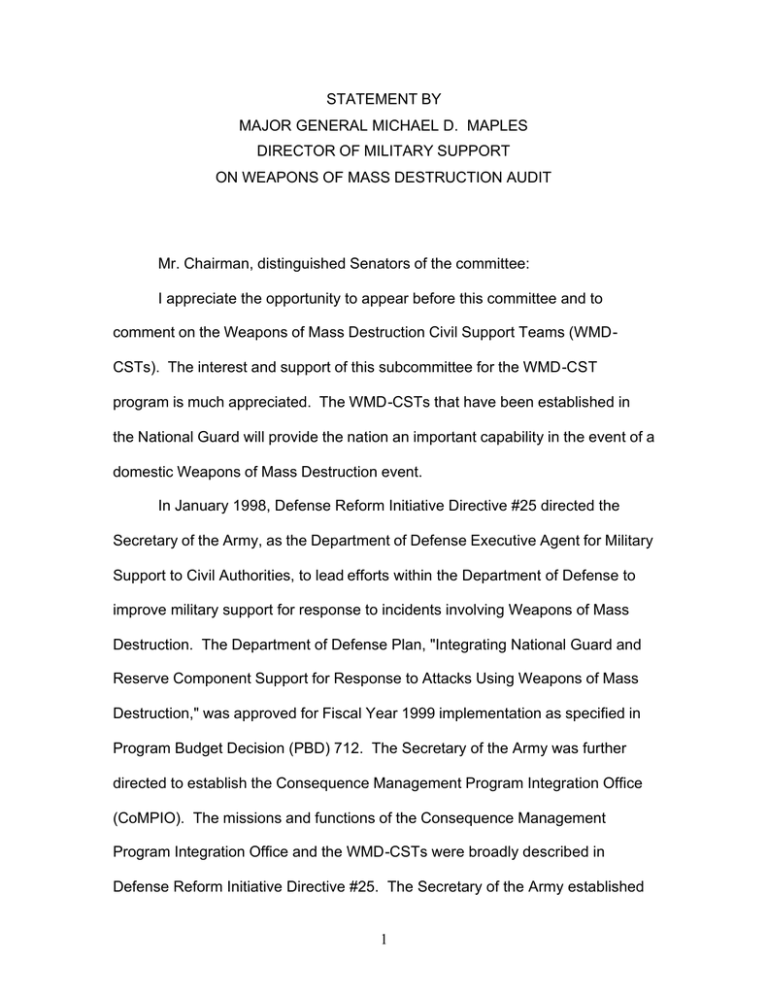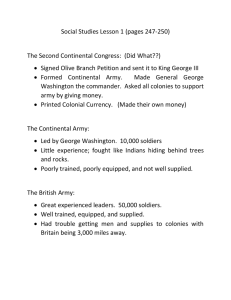STATEMENT BY MAJOR GENERAL MICHAEL D. MAPLES DIRECTOR OF MILITARY SUPPORT
advertisement

STATEMENT BY MAJOR GENERAL MICHAEL D. MAPLES DIRECTOR OF MILITARY SUPPORT ON WEAPONS OF MASS DESTRUCTION AUDIT Mr. Chairman, distinguished Senators of the committee: I appreciate the opportunity to appear before this committee and to comment on the Weapons of Mass Destruction Civil Support Teams (WMDCSTs). The interest and support of this subcommittee for the WMD-CST program is much appreciated. The WMD-CSTs that have been established in the National Guard will provide the nation an important capability in the event of a domestic Weapons of Mass Destruction event. In January 1998, Defense Reform Initiative Directive #25 directed the Secretary of the Army, as the Department of Defense Executive Agent for Military Support to Civil Authorities, to lead efforts within the Department of Defense to improve military support for response to incidents involving Weapons of Mass Destruction. The Department of Defense Plan, "Integrating National Guard and Reserve Component Support for Response to Attacks Using Weapons of Mass Destruction," was approved for Fiscal Year 1999 implementation as specified in Program Budget Decision (PBD) 712. The Secretary of the Army was further directed to establish the Consequence Management Program Integration Office (CoMPIO). The missions and functions of the Consequence Management Program Integration Office and the WMD-CSTs were broadly described in Defense Reform Initiative Directive #25. The Secretary of the Army established 1 the Consequence Management Program Integration Office in January 1998, subordinate to the Director of Military Support. Congress authorized and funded the formation of ten WMD-CSTs in October 1998. Over the next 18 months, the Department of Defense, through the Consequence Management Program Integration Office, organized, trained, and equipped ten WMD-CSTs, while simultaneously developing the doctrine, training programs, and the specialized equipment required to support the mission requirements of these unique assets. Consistent with Congressional legislation and approved Department of Defense plans, special management and parallel processes of development were employed in order to field the teams and provide for their availability as rapidly as possible. Throughout the developmental process, CoMPIO worked with experts from federal, state and local agencies and conducted program status reviews to maintain visibility of program decisions. In January 1999, individuals assigned to the WMD-CSTs began an extensive training program to prepare them both individually and collectively. At the same time, acquisition of specialized equipment required by the teams was initiated. Throughout 1999, the teams and team members improved their professional capabilities by participating in numerous established courses and programs, completing institutional training in June of 1999. In July of 1999, the teams began to receive equipment and to conduct new equipment training. Collective training lanes for the teams were completed in August 1999, and the teams began preparing for external evaluations of their proficiency levels that were administered in February and March of 2000. Thus, in a period of 2 approximately 18 months, ten WMD-CSTs were organized, trained and equipped. Beginning in April of 2000, the commanders of the WMD-CSTs began to request certification. Their requests were endorsed by their respective State Adjutants General and the Chief of the National Guard Bureau before being forwarded to the Department of the Army. These commanders have reported that the teams and all assigned personnel possess the skills, training and equipment to be proficient in all mission requirements. At the same time that the WMD-CSTs were being fielded, trained, equipped, and evaluated, the DoD Inspector General conducted an audit of the program. The Army received a proposed draft audit report and met with members of the DoD Inspector General to understand the basis for the initial findings and to offer additional information if required. The requests for certification were held by the Army in order to consider the initial observations of the audit. The Army was provided a copy of the draft Inspector General audit on October 12, 2000. The Army provided a detailed response on December 7, 2000. The Army concurred with several of the audit findings, particularly those related to program review and the institutionalization of the CoMPIO functions within the Department of Defense. The Army response offered substantive comments on each observation, finding and recommendation, providing additional information and noting those observations that the Army believed had already been addressed by the program's established processes during the 3 period between the time the observations were made and the date the draft report was received. Also on December 7, 2000, based upon the recommendations previously received from commanders, and having given additional detailed consideration to the status of personnel, training and equipment for each team, the Under Secretary of the Army forwarded his recommendation that seven WMD-CSTs be certified. Recommendations for the other three teams have been held pending resolution of readiness concerns and completion of the current program review. In June 2000, the Department of Defense formed Process Action Teams to realign the organizational placement of CoMPIO's functions within the Department. On November 9, 2000, the Deputy Secretary of Defense specified that the Special Assistant to the Secretary of the Army for Military Support would serve as the Program Manager for the WMD-CSTs and directed the Secretary of the Army to prepare a detailed transition plan consistent with a proposed realignment that would institutionalize the functions of the CoMPIO. The Secretary of the Army submitted a transition plan on No vember 27, 2000. The Deputy Secretary of Defense approved a Program Budget Decision on February 14, 2001, that superceded Defense Reform Initiative Directive #25 and directed the disestablishment of CoMPIO. On February 22, 2001, CoMPIO was formally disestablished. Personnel assigned to the former CoMPIO formed the Program Transition Office to support the Special Assistant to the Secretary of the Army for Military Support in the process of transitioning CoMPIO programs and activities throughout the Department of Defense. The Acting Secretary of 4 the Army assigned WMD-CST program functions to the Special Assistant to the Secretary of the Army for Military Support, and the Chief of the National Guard Bureau has been assigned to be the Army proponent for the Weapons of Mass Destruction Civil Support Teams. The Army and the National Guard are fully supportive of the comprehensive ongoing Department of Defense review of the WMD-CST program, and the review of the status of the teams to resolve any remaining concerns to enable the certification process to proceed. The Army remains committed to ensuring that the WMD-CSTs are properly manned, equipped, trained, and are proficient in all mission areas in order to perform their vital consequence management role in a safe and reliable manner. Thank you for the opportunity to appear here today. 5




